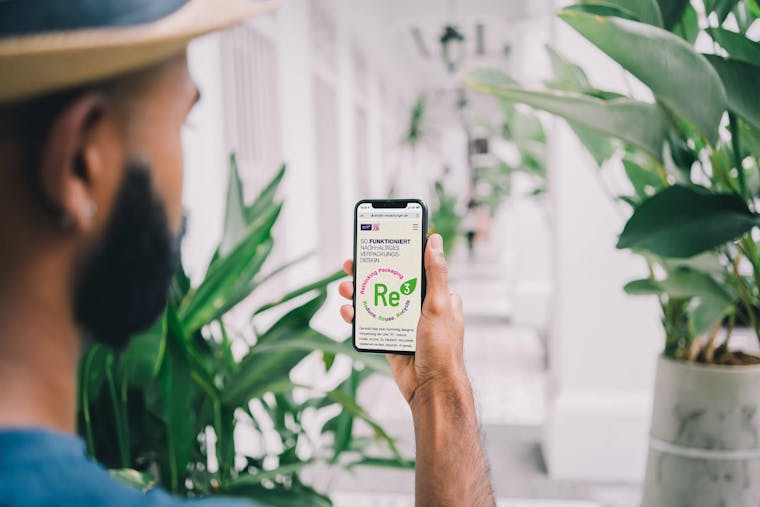Agency for Sustainability Communications
To remain viable for the future and secure their licence to operate, companies today are faced with the challenge of initiating the transformation to sustainable value creation. Companies can fulfil their responsibility towards the environment and society while positioning themselves as competitive players and partners with their stakeholders through strategy-based sustainability measures. However, this can only be achieved through credible, stringent sustainability communication.
As a communications agency specialising in sustainability marketing, we will develop a communications concept tailored to your company.
Your contact



Communicate to your specific target group
Sustainability communication is successful when the company’s position as a sustainable market participant is strengthened in the minds of the target group.
The mindset and genuine sustainable behaviour of companies and their stakeholders are often the focus of (public) attention and have quite an impact on all stakeholder groups. And they are perceived differently by all stakeholders. Every company needs to develop customised communication strategies to present itself effectively and be understood. To achieve this, all stakeholders have to be identified and categorised as target groups, and their sustainability requirements and needs sometimes may also have to be reevaluated. In an open dialogue, it is important to carefully weigh the stakeholders’ interests in order to convey messages in a targeted manner via the right communication channels.
Communicate authentically & credibly
Sustainability communication is often accused of greenwashing. In other words, with the promise of sustainability that is not delivered in reality – a very fine line for companies to walk in the transformation process.
To ensure a high degree of credibility, sustainability communication needs to be transparent and verifiable. And sometimes it may even be better to say and publish nothing at all. This then becomes part of the communication concept and the communication that suits the company in question. For us, this is never a one-size-fits-all approach – but is always customised.
We are convinced that only a holistic approach can meet this requirement and will be happy to advise you on your customised sustainability strategy.
Communicate for the long term
Sustainability communication will only achieve the intended impact if it is communicated consistently and memorably over time.
If you want to credibly convince your target groups of your sustainability performance, you need to do much more than a single shot. With the flood of sustainability reporting, a one-off message wouldn’t even stand out. To be recognised as a sustainable company in the long term, your message has to be communicated consistently over time.
Communicate professionally
Technical jargon is not uncommon in sustainability communication.
However, what sounds good is often meaningless and, in the worst-case scenario, even misleading. As our society becomes increasingly aware of sustainability, there is a growing risk that such terms will be misinterpreted or seen as nothing more than marketing tactics. And this can damage a company’s credibility.
There are now standardised definitions or generally accepted descriptions for many terms. It is advisable to align sustainability communication with current professional wording. This presents the content surrounding the terms in the right light and strengthens the impact of the communication strategy. As an agency for sustainability communications, we are constantly working with the sustainability “lexicon” and incorporating new findings into our work.
International agreements
17 Sustainable Development Goals (SDGs)
The 17 Sustainable Development Goals (SDGs) were adopted by the United Nations in 2015 as part of the 2030 Agenda and are an important foundation for sustainable development.
UN Global Compact
The UN Global Compact is a collaboration between companies and the UN. By signing up, companies commit to complying with the ten principles of the Global Compact, which cover areas such as human rights, working conditions, environmental protection and the fight against corruption.
EU Green Deal
With the EU Green Deal, the 27 EU member states are aiming to become climate-neutral by 2050. By 2030, greenhouse gas emissions need to be reduced by at least 55% compared to 1990 levels. This endeavour is supported by the "Fit for 55" package.
International guidelines and certifications
Global Reporting Initiative (GRI)
Until recently, the Global Reporting Initiative (GRI) was an elementary framework for sustainability reporting. It has now been replaced by the new CSRD and ESRS.
Corporate Sustainability Reporting Directive (CSRD)
The Corporate Sustainability Reporting Directive (CSRD) is an EU directive that requires companies to report on their sustainability performance and environmental impact. It aims to improve the transparency and comparability of sustainability information and therefore provide investors, consumers and other stakeholders with a better decision-making framework.
European Sustainability Reporting Standards
The European Sustainability Reporting Standards are a sequel to the CSRD and form the content framework at the reporting level.
EU Taxonomy
The EU Taxonomy is an EU set of rules for categorising sustainable business activities. It serves to promote sustainable investment by helping companies and investors identify and finance environmentally sustainable projects.
Corporate Supply Chain Due Diligence Duties Act (CSDDD)
The German Corporate Supply Chain Due Diligence Act (CSDDD) contains environmental and human rights due diligence obligations for the entire supply chain.
German Sustainability Code (DNK)
The German Sustainability Code (DE = DNK) contains basic requirements for reporting on sustainability aspects and can be applied by any company.
EMAS
EMAS stands for “Eco-Management and Audit Scheme” and is a voluntary environmental management system of the EU. It enables organisations to monitor, assess and reduce their environmental impact while reporting transparently on their environmental performance.
ISO 14001
ISO 14001 is an international standard for environmental management systems. It specifies the requirements for establishing, implementing, maintaining and continually improving an environmental management system. EMAS incorporates the contents of ISO 14001, which is why registration with EMAS also confirms fulfilment of ISO 14001.
Science Based Targets Initiative (SBTi)
The Science Based Targets Initiative (SBTi) supports companies with setting climate-related targets that are scientifically sound and contribute to combating climate change in accordance with the goals of the Paris Agreement. This includes, for example, setting emission reduction targets.
Compensation Projects
Greenhouse gas emissions are offset with compensation or offset projects. Internationally recognised climate protection projects are accredited, approved and monitored in accordance with the Gold Standard, Verified Carbon Standard (+ Climate, Community & Biodiversity Standard) or the Clean Development Mechanism.
Definitions relating to sustainability communication
Sustainability Communication
Sustainability communication describes all communication activities that report on internal and external sustainability-related measures.
Sustainable Storytelling (SuS)
Sustainable storytelling (SuS) encompasses storytelling in the thematic realm of sustainability. It is all about creating stories that deliberately promote sustainable values and practices with the aim of informing and inspiring people and encouraging positive change.
Sustainability Marketing
Sustainability marketing refers to marketing strategies and activities in which companies highlight their sustainable practices and values to demonstrate their commitment to environmental, social and economic responsibility while promoting sustainable products or services.
Sustainability Report
The sustainability report informs stakeholders about a company's sustainability performance. The content of the sustainability report is determined by legally defined frameworks such as GRI or ESRS.
Sustainable Brand Leadership
Sustainable brand leadership refers to the position of a company or brand as a forerunner in the area of sustainability. It covers the successful integration of sustainable practices and values into all aspects of the brand, from production to marketing and customer interaction.
Our expertise
We can provide you with a complete sustainability programme – from the development of a sustainable strategy to its successful implementation.
Our experienced management team and a dedicated sustainability team (certified sustainability managers) are committed to ongoing training – and they also work internally to design and promote sustainable processes in our agency. We always keep up to date with the latest legislation, social trends and industry-specific challenges. We are actively involved as members of relevant national sustainability committees and working groups, act as speakers and organise workshops.
Our many years of expertise in the area of sustainability include
- Development of sustainability strategies
- Communication of sustainability efforts
- Conducting sustainability audits
- Managing Reputation and Corporate Social Responsibility (CSR)
- PR and marketing support
Your contact
20 years of experience in sustainability issues, e.g. in mechanical and plant engineering, in the food industry, in the tourism industry. Sustainability reports (GRI, DNK), brochures, sustainability websites, films and video streams, moderation.






